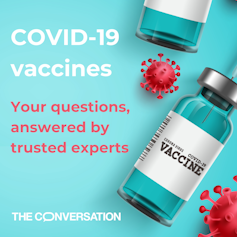Health
Why ensuring trust is important in reducing COVID-19 vaccine hesitancy

Polling data from this summer showed that 2.1 million Canadians (seven per cent of the adult population) were hesitant to get a COVID-19 vaccine.
Most of these adults lack trust in the government and vaccines. They worry about vaccine safety, a lack of communication about the process underlying vaccine development and a lack of transparency about vaccine trials and side-effects.
Their experience illustrates how trust is embedded in safeguarding public health. And what’s crucial for public health is widespread vaccination uptake. We need to understand how trust can be developed and, in many cases, rebuilt. To address this question, we draw on our research on trust.
Trust and society
A trusting person relinquishes control over what they do in return for security and comfort. When we trust each other, we accept what others bring into our lives, even if we do not understand what they bring.
When we get vaccinated based on public health recommendations, we trust these recommendations; we do not need to check up on them. When trust is absent, we ignore the recommendations and find our own information (or disinformation).
Trust is thus necessary for the social fabric of society: it reduces the uncertainty and complexity inherent in social relations. Accordingly, trust maintains social order, civic engagement and co-operation.
Trust: Cognitions and emotions
In our research, we show how trust has two crucial building blocks. First, trust involves what we know; it relates to our cognitions (like how we perceive vaccines). We trust someone more when we know them better. We derive this knowledge from various sources, such as interactions and observations (like social media).
Second, trust involves what we feel; it implicates our emotions (like how we feel about vaccines). We trust someone more when we feel better about them. Our emotions are built through goodwill, motivations, shared values and a sense of belonging.
Since trust has two components, we need to be attentive to each of them when we wish to enhance trust. We need to think about how we can strengthen what we know and how we feel.
Organizational transparency and trust
Transparency builds trust. Transparency appeals to the cognitive side of trust.
When pharmaceutical companies are more transparent, like disclosing vaccine development protocols and allowing third-party reviewers, we know more about vaccines and trust them more.
Transparency also engages the emotional side of trust. When pharmaceutical companies are more transparent, we sense that they are intrinsically motivated by their concern for public health, enabling an emotional bond to form. We feel that they care about us, and we trust the vaccine more.
Government communication and trust
Enhanced communication builds trust. When governments disclose vaccination plans, we know more about public health strategies targeting the pandemic. We feel that governments care about us and create the conditions that enable us to live our lives.
Decisions like that of the Conservative Party to not disclose its candidates’ vaccination rates do the opposite. They prevent us from accessing relevant information and suggest that containing the pandemic is not a priority. They damage emotional bonds around shared communal responses against the virus.
Recent measures: vaccine lotteries
As vaccination uptake in Canada levelled off, governments started to deploy various measures to boost vaccination, like lotteries, mandatory vaccinations and vaccination passports.
Take lotteries for example — our two-dimensional approach to trust suggests that they are problematic. They fail to involve the cognitive side of trust: lotteries provide little if any new information, and may damage emotional bonds. Although they suggest that governments care about public health, we might question why lotteries, in particular, were chosen.
Lotteries had little effect on vaccination rates, and some people felt that lotteries unfairly penalized those vaccinated early on and compensated late adopters who may have already exposed others to the virus. Nevertheless, the case illustrates how public health measures need to be examined for how they affect trust, if they don’t work or, worse, backfire.
Recommendations on how to enhance trust
Governments and public health organizations need to speak to the cognitive and emotional sides of trust through their communications and practices — they need to explain vaccines and other public health measures while also speaking to the broader purpose of caring for the community we belong to and depend on.
A Montréal-led global survey shows that people get vaccinated for altruistic reasons, like believing that it is good for the general population.
Coercive measures like vaccination passports need to be approached carefully because they threaten individual autonomy. Autonomy appeals to the emotional side of trust by motivating us to make decisions like adhering to rules and its cognitive side by enabling us to access information that helps us make informed decisions.
Coercive measures need to be accompanied with explanations, like why are they required, and outreach that highlights mutual care. Otherwise they can backfire and lead to vaccine resistance.![]()
Nelson Duenas, PhD Candidate in Accounting, Concordia University and Claudine Mangen, RBC Professor in Responsible Organizations and Associate Professor, Concordia University
This article is republished from The Conversation under a Creative Commons license. Read the original article.






















